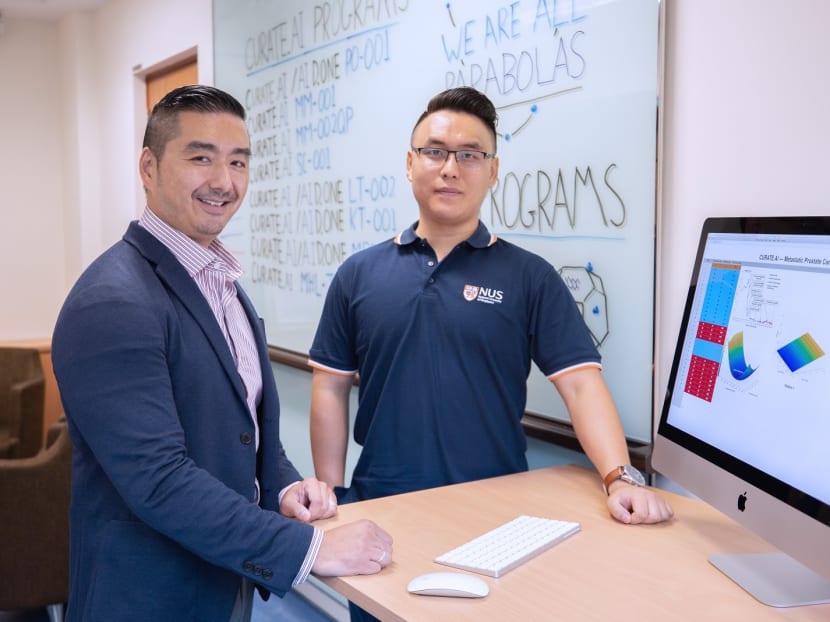AI successfully used to halt prostate cancer in NUS trial
SINGAPORE — For the first time, Artificial Intelligence (AI) has been used to optimise the drug dosage used in prostate cancer treatment, successfully halting the disease’s progression in a clinical study.

Professor Dean Ho (left) and Mr Theodore Kee (right) from the National University of Singapore, together with their research team, used AI platform CURATE.AI to successfully treat a patient with advanced prostate cancer, completely halting disease progression.
SINGAPORE — For the first time, Artificial Intelligence (AI) has been used to optimise the drug dosage used in prostate cancer treatment, successfully halting the disease’s progression in a clinical study.
“This marks a major and groundbreaking shift in the way that oncology can be treated,” said Professor Dean Ho, director of the Singapore Institute for Neurotechnology (SINAPSE) at the National University of Singapore (NUS).
Prof Ho leads a seven-member research team which developed an AI platform called CURATE.AI, used in the trial. The team is backed by trusts such as the Wallace H Coulter Foundation and V Foundation, which have a history of working with US colleges and professional medical societies in cancer research.
In a 16-month AI-driven oncology research project, the research team was able to use CURATE.AI to successfully reduce the tumour size and levels of prostate specific antigen (PSA) in a patient with metastatic prostate cancer.
PSA is a protein produced by the prostate. A high PSA level can be an indication of a number of benign conditions, including prostate cancer.
The preliminary research findings for the ongoing study was published in the journal Advanced Therapeutics on Aug 31.
In the study, the patient was treated with multiple drugs under fixed and high dosage combination therapy for six weeks. Subsequently, the AI platform was used to calculate the drug dosage for the patient.
In one instance, running counter to traditional cancer treatment methods where drug dosages are usually increased until the patient stops responding to the drug, before exploring other treatment options, the AI platform suggested a 50 per cent reduction in the drug dosage.
Following the reduction, the patient recorded the lowest levels of PSA and his cancer tumour shrank in size (from 3mm to 1mm) after 16 months.
“Traditional methods utilise the maximum tolerated dose of the drugs to treat patients due to the belief that higher dosing results in higher efficacy. However, our study has shown that in combination therapy, CURATE.AI guided substantial dose reduction can increase efficacy. [The platform] for the first time, enables the clinician to know how much and when to reduce the dose to increase efficacy,” said Prof Ho.
“Without CURATE.AI, there is no way for clinicians to know how to dynamically change cancer drug dosing to continually optimise care,” he added.
Stating that the AI platform individualises and optimises each patient using only their own data, Prof Ho said this method “takes all the guesswork out”.
The research team is recruiting 10 more patients in the next three months from public hospitals. For a start, Prof Ho said they would be recruiting patients with blood, lung and liver cancer.
Prof Ho said that the team started off using AI to determine drug dosages for prostate cancer because there is a “clinically accepted biomarker” that accurately reflects treatment efficacy — in this case, PSA levels — which can be quantified using simple blood draws.
Blood cancers have similar clear markers and hence can be “straightforwardly applied”, explained Prof Ho.
Other than such markers, imaging can also be used for certain cancers as the indicator of treatment efficacy. In addition, treatment safety can also be optimised in conjunction with the AI platform as there are ample blood tests for toxicity measurements, he said.
Prof Ho and his team are based at the NUS. Prof Ho said that while the patient in the clinical study was American, the AI platform is “scalable” and can be applied to patients of all ethnicities, since the data and treatment regimen is personalised.
“This means that when we use the system here in Singapore, we can simultaneously treat patients in Taiwan, Japan, globally,” he said, adding that he expects the product to be available in the market between three and five years.
Sign up for TODAY's WhatsApp service. Click here:








